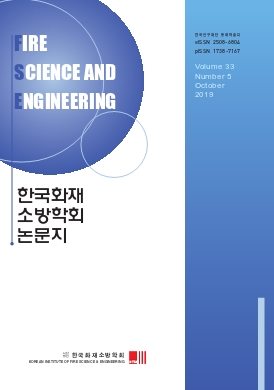목재 가연물의 연소 시 생성되는 탄화가 열분해에 미치는 영향
Effects of Char Produced from Burning Wood Combustibles on Thermal Pyrolysis
- 한국화재소방학회
- 한국화재소방학회논문지
- Vol.33 No.5
-
2019.107 - 12 (6 pages)
- 80

목재 연료의 연소 시 생성되는 탄화가 열분해 과정에 미치는 영향을 고찰해 보기 위해서 ISO 5660-1 콘칼로리미 터 실험을 수행하였고 Fire dynamics simulator (FDS) 전산해석 결과와 비교 분석하였다. 목재 연료로는 건축자재, 가구재 등에 대표적으로 사용되는 Douglas-fir를 사용하였다. Douglas-fir 연소 시 측정된 열방출률은 FDS 전산해석을 통해 예측한 결과와 비교적 잘 일치하였지만 탄화 층의 표면반응을 고려하지 않는 FDS 전산해석 모델은 훈소과정에 서 지속적으로 방출되는 열을 예측하지 못하였다. 그럼에도 불구하고 FDS 전산해석을 통해 탄화 층은 가연물에 열 장벽을 형성하여 내부로의 열전달을 방해하고 열적 두께를 두껍게 하여 열분해율을 감소시키는 것을 확인하였다.
To investigate the influence of the char layer formed during the combustion process on the pyrolysis of wood combustibles, ISO 5660-1 cone calorimetry experiments and Fire dynamics simulator (FDS) simulations were performed, and the results from these two methods were compared. The wood combustible selected as the fuel for this study, Douglas fir, has been widely used for the production of building materials, furniture, etc. The heat release rate (HRR) measured from the cone calorimetry experiment was in good agreement with the result predicted by the FDS simulation. However, the FDS simulation failed to predict the heat released by the smoldering combustion process, due to the absence of the char surface reaction in the model. The FDS simulation results clearly indicate that the char layer formed on the surface of combustibles produces a thermal barrier which prevents heat transfer to the interior, thickening the thermal depth and thus reducing the pyrolysis rate of combustibles.
1. 서 론
2. 실험 및 전산해석 방법
3. 실험-전산해석 결과 및 고찰
4. 결 론
(0)
(0)